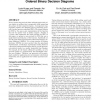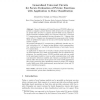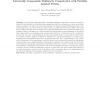71 search results - page 12 / 15 » Round-Optimal Secure Two-Party Computation |
CCS
2006
ACM
13 years 11 months ago
2006
ACM
Privacy-preserving protocols allow multiple parties with private inputs to perform joint computation while preserving the privacy of their respective inputs. An important cryptogr...
PKC
2007
Springer
14 years 1 months ago
2007
Springer
Abstract. Yao’s classical millionaires’ problem is about securely determining whether x > y, given two input values x, y, which are held as private inputs by two parties, re...
IPPS
2005
IEEE
14 years 1 months ago
2005
IEEE
1 Electronic fair-exchange protocols have received significant attention from the research community in the recent past. In loose terms, the fair exchange problem is defined as at...
ICISC
2008
13 years 9 months ago
2008
Secure Evaluation of Private Functions (PF-SFE) allows two parties to compute a private function which is known by one party only on private data of both. It is known that PF-SFE c...
TCC
2009
Springer
14 years 8 months ago
2009
Springer
It is well known that universally composable multiparty computation cannot, in general, be achieved in the standard model without setup assumptions when the adversary can corrupt a...



